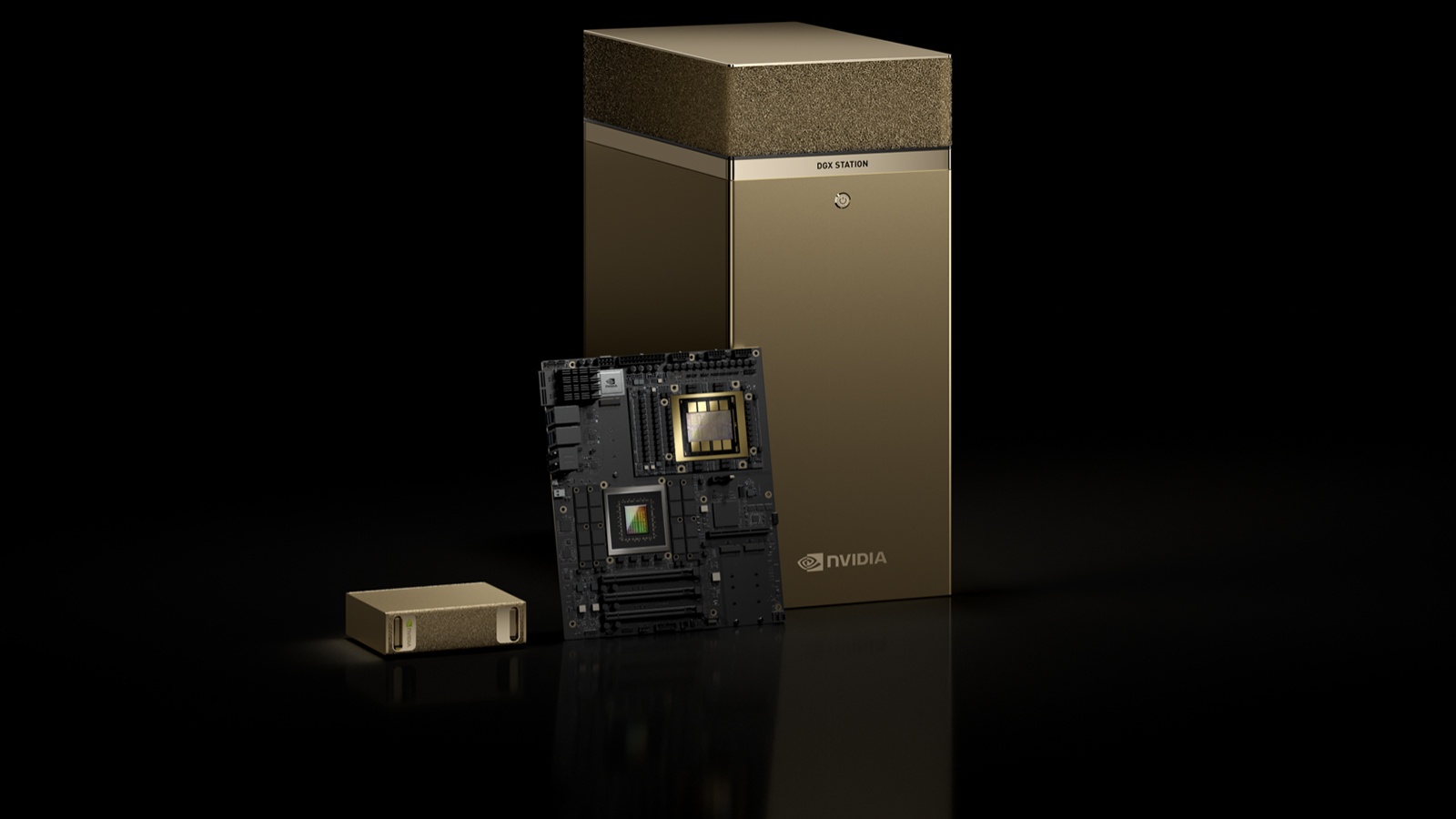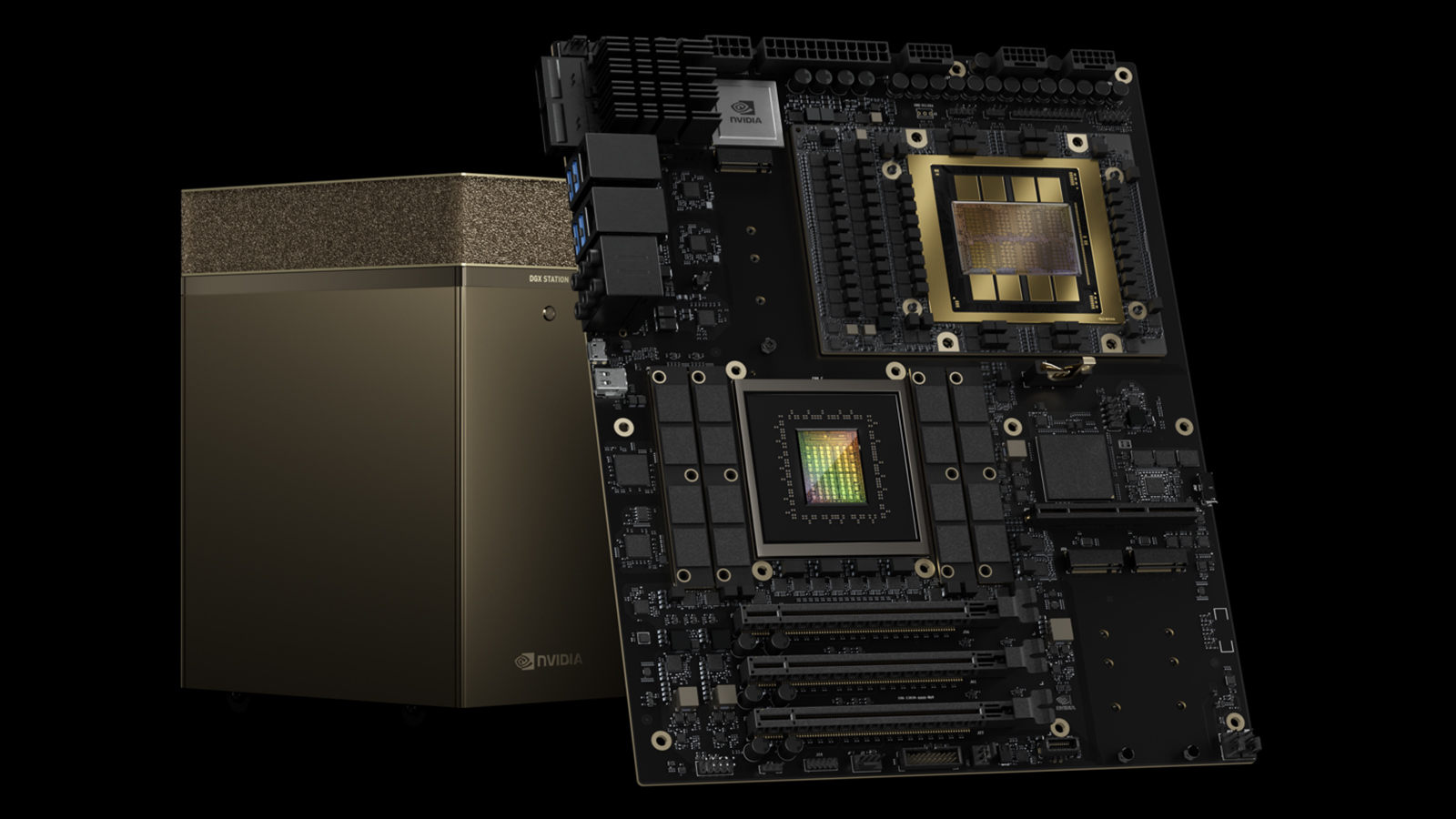Nvidia unveils DGX Station workstation PCs with GB300 Blackwell Ultra inside
Well, AI workstations.

At GTC 2025, Nvidia introduced its DGX Station workstation platform that packs its upcoming GB300 Desktop Superchip that combines a Grace CPU with a Blackwell GPU for AI. The machine is aimed at software developers, researchers, and data scientists and will be available later this year from various workstation OEMs.
Nvidia's DGX station workstation platform carries the GB300 Desktop Superchip (the first mention of a desktop-grade 'Superchip' that we see) that comprises a Grace CPU that connects using NVLink C2C interface with Nvidia's Blackwell Ultra GPU (which comes in an SXM form-factor) featuring the latest-generation Tensor Cores with enhanced FP4 precision. The machine is set to feature 784 GB of unified memory between the CPU's LPDDR5X and GPU's HBM3E, which will be handy for AI workloads.
By launching its DGX Station based on the GB300 Desktop Superchip platform as well as the DGX Spark powered by the GB10 Grace Blackwell Superchip, Nvidia sets the stage for its Arm-based desktop workstation platforms that will be aimed at broader market segments beyond data scientists, researchers, and software developers.
Nvidia has yet to disclose the 'Desktop Superchip' specifications. For now, it is reasonable to assume that the company calls 'Desktop Superchip' a combination of Grace CPU and Blackwell Ultra GPU components in configurations optimized for desktop PCs. In particular, we are talking about power consumption. Speaking of which, the motherboard has regular ATX + EPS12V power connectors for the CPU and other components and three 12V-2×6 (H++) connectors that can theoretically deliver up to 1800W to the GPU.
In addition, the motherboard has three PCIe x16 slots for add-in-boards, three M.2 slots for SSDs, audio connectors, and USB connectors.
For connectivity, DGX Station is equipped with Nvidia's ConnectX-8 SuperNIC, a networking component that supports speeds of up to 800 Gb/s to link multiple DGX Stations for collaborative AI projects. The high-speed networking also ensures smooth scaling for users working with extensive AI models or distributed computing tasks.
Nvidia didn't disclose the recommended pricing of its DGX Station, which will be sold by Asus, Boxx, Dell, HP, Lambda, Lenovo, and Supermicro. Keeping in mind that each compute GPU in an SXM form factor costs tens of thousands of dollars, the DGX Station will likely cost a five-digit sum.
Get Tom's Hardware's best news and in-depth reviews, straight to your inbox.

Anton Shilov is a contributing writer at Tom’s Hardware. Over the past couple of decades, he has covered everything from CPUs and GPUs to supercomputers and from modern process technologies and latest fab tools to high-tech industry trends.
-
Silicon Mage I'm here from the future to tell you that Scalpers immediately snap these up within 5 minutes of release and resell them for the price of a house.Reply
More than a few gamers buy these to complete their "Dream Builds" so they can run their games at >1000fps. -
spongiemaster Reply
Price of previous generation DGX stations was $150k for the higher spec build so they already cost as much as a house. No scalper needed.Silicon Mage said:I'm here from the future to tell you that Scalpers immediately snap these up within 5 minutes of release and resell them for the price of a house.
More than a few gamers buy these to complete their "Dream Builds" so they can run their games at >1000fps. -
alan.campbell99 Hmm, three 12V-2x6 connectors pumping 1800W into the board? The connectors look reasonably close to the GPU but it could get interesting . One of those connectors on the 4090/5090 has caused headaches, how will it fare with three here?Reply -
Elrabin Reply
Been working this on the datacenter side with servers with a combination of SXM and PCIe stand up GPUs and on the server side, it's been zero issue. I can't tell you how many tens of thousands of PCIe GPUs i've sent out the door for my customer and not a single failure of a 12v connector so far after about 3 years since the first one went out.alan.campbell99 said:Hmm, three 12V-2x6 connectors pumping 1800W into the board? The connectors look reasonably close to the GPU but it could get interesting . One of those connectors on the 4090/5090 has caused headaches, how will it fare with three here? -
Elrabin Reply
SXM cards have zero outputs. Compute onlyKennyRedSocks said:Can the SXM be used for graphical output or is it solely for compute? -
bit_user Reply
@KennyRedSocks , not only do they lack display outputs, but they also lack the fixed-function hardware blocks needed for good gaming performance. Volta (of V100 and Titan V fame) was the last 100-series "GPU" to have a full contingent of that stuff.Elrabin said:SXM cards have zero outputs. Compute only
What I'm getting at is that a modern Nvidia 100's series model wouldn't even be compelling for cloud gaming.
